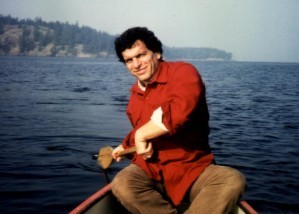 The great secret of death, and perhaps its deeper connection with us, is this: that in taking from us a being we have loved and venerated, death does not wound us without at the same time, lifting us toward a more perfect understanding of this being and of ourselves.
The great secret of death, and perhaps its deeper connection with us, is this: that in taking from us a being we have loved and venerated, death does not wound us without at the same time, lifting us toward a more perfect understanding of this being and of ourselves.
~Rainer Maria Rilke, letter to Countess Margo Sizzo-Noris-Crouy, January 23, 1924
***
Some days, thoughts of my husband Vic fade to the edge of consciousness, but love is always close, waiting to be called. When life hurts or when I have a special joy, Vic shows up in dreams and vivid memories.
If I look for the individual man as he was, I can’t find him. His body and laugh, his talents and flaws are gone. As Rilke suggests, death bring a “more perfect understanding of this being and of ourselves.” It also brings an idealized view of the person and the past.
Without the living person to block the light, I’m left with ideal images, some private and some shared, all seen through the hazy lens of memory. I remember Vic’s warm brown eyes and enveloping arms through a veil of time, but something remains that’s as strong as when he was alive. Maybe stronger.
My human lover morphed into the Beloved Inner Masculine, a mysterious joining of Vic the man and the masculine aspects of my own psyche independent of him. In the language of Carl Jung, Vic became my Animus Ideal, my Divine Lover and Masculine Friend.
“You are my Guru of Love,” he told me before he died.
I was. And he was mine.
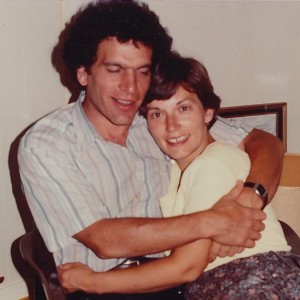 He didn’t push me away when I was upset. Instead, he was curious and tried to understand. Sometimes, our egos grated against each other, but we could disagree without inflicting mortal wounds. We eased each other’s fretful anxieties and cheered each other on.
He didn’t push me away when I was upset. Instead, he was curious and tried to understand. Sometimes, our egos grated against each other, but we could disagree without inflicting mortal wounds. We eased each other’s fretful anxieties and cheered each other on.
I’m grateful for those times. I miss the love in his eyes. I miss sharing dreams and talking through life’s joys and confusions. I miss having an animus projection with a body.
We walked together for forty-two years. Almost eight years after his death, we’re still crossing paths, but our relationship is interior now. My new animus is built on images of a lover and friend, but it’s more than the remnants of memories and the past. My inner masculine changes as everything does, so it isn’t stuck with an old image of Vic. It transforms along with me.
One dark night before Vic was sick, wind rattled the windows and the woodstove filled the room with warmth. Lights were low. We had just meditated. My tears blotched Vic’s clean shirt. He rocked me side to side. I wept for something I’ve forgotten now, but I remember what he said.
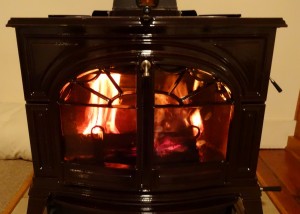 “It doesn’t get any better than this, E. It doesn’t get any better than this.”
“It doesn’t get any better than this, E. It doesn’t get any better than this.”
In time, those words became a mantra, an idea I could return to, a place to rest. Life doesn’t have to be perfect. I don’t have to be perfect. I just have to look for the goodness as it is at this moment. I made it through the winter. Spring is here.
“It doesn’t get any better than this.”
Even when the conscious me forgets, my inner masculine remembers. I bring myself back to the warmth of the wood stove, the protection of his arms, the sweet scent of the man, and wrap myself in the truth of those words.
***
How does your relationship with someone who has died continue on? Are you strengthened by your continuing bonds, or is their absence too painful to endure? Or are both true? It’s taking me many years to shift from outer to inner. I’m still working on it. For earlier posts about living with love after a spouse’s death, see Flowers for the Living, Flowers for the Dead or Before and After: When My Old Life Died, My New Life Began.
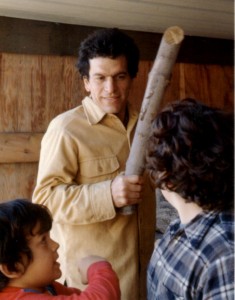
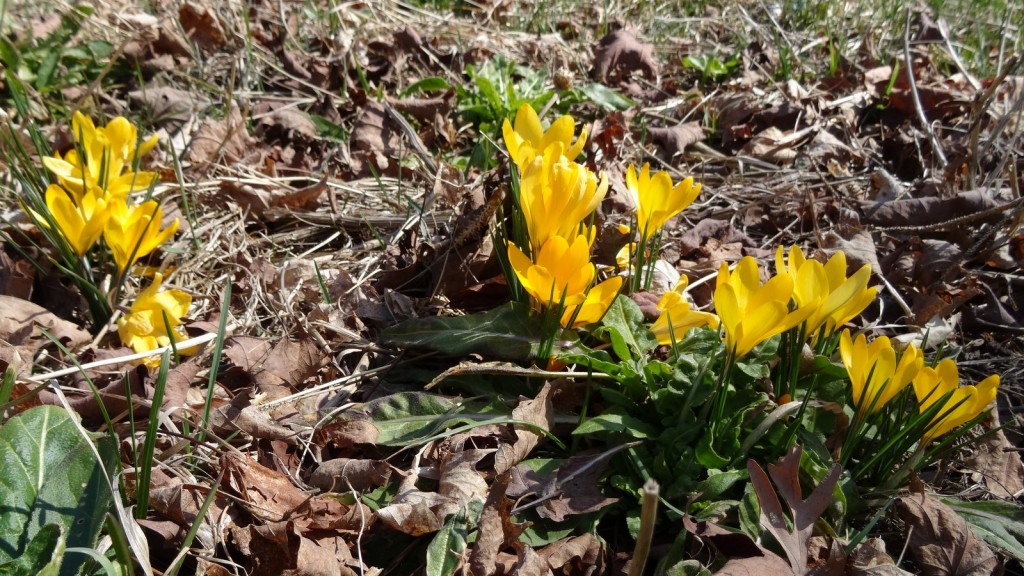
Dear Elaine, As always you write with the beautiful, and gifted hand of the poet! For my heart rose and fell so many times whilst reading, through each and every beautiful sentence of yours. Oh my goddess, how I wrap myself up in the truth and elegance of your words today as my heart holds out for tomorrow, praying for the right strength and courage to come. Gently reminding myself to breathe.
‘… Love is always close, waiting to be called.’ Yours is an exquisite love and what joy to read of Vic’s ‘warm brown eyes and enveloping arms.’ I whole-heartedly agree with him, it doesn’t get any better than this! I get hugely excited when I see that you’ve written a new article, love the wonderful photo’s you’ve included, most especially the one will you both in each other’s arms. Love and blessings, Deborah.
You are always so generous in your comments, Deborah. Thank you. I’m trying to think something through in this piece. I’m not sure I quite have it yet. In retrospect, I might have begun with a memory of Vic whispering in my ear during a memorial service of an older friend. It was just a few months before Vic’s death. He said, “Don’t let them make me sound like an angel.” I don’t think I’ve followed that request well, but there is a natural idealization that happens. The petty stuff of a human relationship falls away until only bright and shining Love remains.
I’m sure this would be different if the actual relationship had been one of disharmony, betrayal, unkindness, and all the other things that can happen. I’m grateful that hasn’t been my experience, so I’ll continue to let the ideal positive animus grow and try not to conflate that with the actual man who did have warm brown eyes and enveloping arms.
Interesting to read this Elaine. I just wrote a note to someone who posted a picture of herself with two women friends, both of whom have died, or passed through death’s doors, or transitioned or…
I was reflecting on how those who remain alive carry the passed friend/family member with them unseen.
There is no relationship we experience without it effecting us or changing us or which has now been integrated into us.
Those who are gone ARE us now in either smaller or larger ways. You speak of it with reference to Vic as the ” beloved inner masculine.” For me, those who are gone often remain in very specific ways of being or doing.
My sister Devon died years ago, and yet still when I do a particular kind of drawing I see her hand. A stroke that she used to use in her work shows up in mine. I hadn’t realized that I had digested this move unconsciously from looking at her paintings throughout the years until it jumped off the page one day and I recognized her presence. When competent, my diplomat father is near. When my creative clutter looms large I feel Nancy, a friend’s mother who happily lived in a certain kind of creative chaos. My great grandmother Lydia gave me the strength of a woman who fought for her rights and the rights of all women.
I cannot help but honor them through my living, they have become me, and with that they remain an integral albeit hidden part in this ongoing mystery of life.
Your perspective works for me, Lauren. I’ve integrated so many of Vic’s skills, talents, and perspectives. I see my paternal grandmother in the gardener and cook in me, the woman who loved living in the country. I see my mother in my drive and need to do something in the world. I see her in so many things about my body even though we didn’t look alike. I see my teacher Anthony in my ways of thinking things through and questioning ideas. Now that you have me going, I see many things I’m learning from people who are alive, too–like you. Your curiosity, your daring, your ability to put everything aside and show up at the moment you are needed. I loved remembering your sister Devon when you were injured and spending hours painting.
It continues. And may I be bold here – to suggest that the relationship changes and grows. My hellion daughter, who, in her lifetime told me more than once to “fall off a mountain”(and worse), has tamed down since she died. She is on my side, encouraging me more and more, although she is still my harshest critic. I hear her voice, “Mom, T.M.I., too much information,” as well as, “Mom, you can do this.”
That’s not bold, Robin. It’s just true. The relationship changes and, for me, it softens and gets a little veiled and idealized. Right after Vic died, I could only remember sickness and suffering. That’s not true anymore, although it comes up sometimes. There must be much more transformation of the relationship when a daughter who is young and rebellious dies. I’ve heard you express both those sentiments. Too much information and you can do this. We can go a long way with that good advice.
Believe me, nothing would be better than to be sitting by you, squeezing your hand, looking into your eyes, seeing your Beautiful smile,and be smitten yet again.
From Richie….
Those were some words from my darling saved from a text. My …. It does not get any better then this!!
Thanks again Elaine for your lovely sentiments.
Xo
Lori
Oh sweet Richie. We were lucky to be married to lovers, Lori, and it hurts that they had to go through hard illnesses and leave. I’m grateful for all those snippets of saved information and love notes. Each is precious. Thank you for sharing yours. I hope you have many treasures like that. Love to you.
You manage to be both direct and subtle in the same piece perhaps because your conscious and subconscious minds work together so well. Hmmm
I love the line “Almost eight years after his death, we’re still crossing paths, but our relationship is interior now.” I believe I can say that about my mother after nearly two years since her passing. I am certain that her memory fires my passion to complete my memoir.
You show how hard it would be to let go of “warm [blue] eyes and enveloping arms.” Yet you persevere and bring hope to others, a sweet camaraderie. I like the sunshine in your title today, Elaine.
Thank you, dear Marian. To prove the point of crossing paths with ones we love after their death: yesterday, a young woman I’ve known since her birth sent photos she found when cleaning out her dad’s house. They’re from 1996. Most are of Vic as best man at a wedding with sweet affectionate body language between Vic and the groom. They were having a great time. At the bottom of the pile was a photo of Vic lying on his back on a lounge chair and me dropping cake into his mouth with oh-so-delicate fingers. The sweet silliness between us shines through. I’m glad I’m in a place where I can take in the sunshine of the photo without drowning in the darkness of Vic’s absence.
🙂
Another honest, insightful, beautifully written post, Elaine. I particularly love how you take the time to reflect and garner new insights about your inner life; in this case, about how your animus keeps growing and changing. Such a perfect example of this extraordinary quote: “…death does not wound us without at the same time, lifting us toward a more perfect understanding of this being and of ourselves.”
This prompts me to reflect on the effect my father’s death had on my animus-image at the age of eleven, and how it keeps changing too. Certainly I idealized Daddy for a long time after that…expected all men, my husband, and my own animus, to only have his nobler qualities. Which naturally made it difficult for me to see, accept and forgive his shadow, my husband’s shadow, and my own negative animus. I imagine that girls growing up with living fathers must find it easier to remove their God-image projections from men and their animus than I did. I like viewing my animus from this angle. Thank you for another inspiring piece.
Thank you for your reflections, Jeanie. As you know my “perfect” papa died when I was 14. My first thought when I met Vic and his motorcycle was, “He reminds me of my father, and I want to marry him.” I had no evidence to back it up. It startled me, but I knew in the way a 21 year old can know that he was the man for me. When I told Marion Woodman that story in the context of discussing Eros and Psyche, she laughed and said with long drawn-out words: “You… were… so… lucky.” Marion knew Vic by then, so she had evidence. My intuition could have been a disaster, but it turned out he was like my father in a few essential ways such as being an affirming and supportive man. I had to do some psychological work soon after we were married to understand that I’d projected father/animus on him and understand that could lead us to trouble.
Wow. Sam said something similar only a month before he died. “We’ve got it made, babe.” I remember the moment, the place, the smells, the view of the pond. Such memories offer solace and sweet balm when I miss him most.
I’m glad you have this rich memory, Jill, bittersweet though it is. We could busily construct ways we don’t have it made or things could be better than this, but instead we can just take in those nurturing lines and images. You’ve got it made, babe.
Your writing just takes my breath away, dear Elaine. Thank you ♥
Thank you, Marty. Your beautiful words mean so much to me. I’m grateful.
Thanks for this, Elaine. My relationship with Adrian changes too–it waxes and wanes, sometimes comforting and inspiring, other times missing, and yes–I haven’t completely forgotten the pain at the end. I have a cd that reminds me of him every time I play it. His four sons bring him back when I talk to them. Many versions of him visit me in my dreams. I feel, perhaps irrationally, that some part of him is still with me. I smile.
I’m glad you have these ways to feel Adrian, Lynne. Music is such a healer and I miss being able to hear it with pleasure–although I hear important songs in my head, including “Dance Me to the End of Love” by Leonard Cohen. And then there are the sons. These continuing connections with our dead spouses feel like part of the unexplainable mystery to me. I also have memories of the suffering, but it taught me a lot about the nature of life and how to handle the hardest darkest moments. I smile with you.
I feel I’ve just read a prose poem, Elaine. A strikingly beautiful prose poem. This line jumped out at me:
“It also brings an idealized view of the person and the past.” That has certainly been my experience. I’ve had to let many things “go” over the decades and I’ve found I have, at times, valued the things I’ve lost much more AFTER than I ever did BEFORE I lost them (or let them go). How beautiful that you knew just what you had, both in the AFTER and in the BEFORE.
Thank you, Janet. I think this is a common experience. The things that drove us crazy become amusing or endearing.
About before and after: Sometimes I appreciated what we had together, but not always. It’s easy to take things for granted and forget. I met Vic when I was 21, so couldn’t quite imagine adult life without him. If you had asked me then if I valued what I had, I would have said yes. From where I stand now, I didn’t truly know how much I had to lose.
I hope this is read by very many Elaine, it is so true that our relationships with loved ones who’ve died changes even though the pain and pleasure may still be present. Thank you for this deep and beautiful post.
Thank you, Susan. Yes, pain and pleasure seem to be constants we can count on. I appreciate your encouraging words–and I’m already behind reading your A-Z posts.
Elaine…your thoughts are so important to me. I lost a great love 25 years ago and found just what you say to be true….the relationship continues and grows. I am in the final days of the Love of my Life, who is peacefully sleeping beside me. A few days ago, he told me that “We …are a complete sentence.” These final gifts are treasures, in the midst of heartache, fear and grief. I have no doubt that the invisible strings that connect us will be strengthened as he transitions. And that he will be part of me in every way. But, this sad goodbye is also the hardest thing I have ever done. As your book so well describes.
Thanks for taking the time to leave a comment, Cynthia. My heart goes out to you. I imagine you caring for the Love of your Life, the one who could say to you, “We are a complete sentence.” I remember the heartache, fear, and grief well, and also the sacred grace that permeated everything. I’m glad your love was sleeping peacefully when you wrote this and that he was beside you. It’s a comfort to truly know he will be part of you always and you know that so well. I also hear you when you say it’s the hardest thing you’ve ever done. I send you love and prayers for a peaceful passage. I hope you have plenty of support along the way.
Elaine, I love the photos in this post, the way that you are “working out” your inner life thoughts, and the recognition of the idealization that sets in after loved ones are gone. In the photo of Vic holding you, I see you looking into the camera at your future self, sending love and strength, masculine and feminine, to the future Elaine. I see Vic, eyes turned inward and downward, giving you more than a temporal hug.
Thanks for your reflections, Shirley. You always bring up something new. Vic leaned toward me at a friend’s memorial service about four months before he died and said, “Don’t let them make me sound like an angel.” He had so few wishes at the end of life, but he was clear about this one. At his memorial service, I was relieved when a friend told funny stories about Vic and broke the saintly spell with laughter. It’s not easy to share Vic’s sense of humor, but he was naturally funny. I like what you see in the photo. I can see that, too. My mom took that photo in 1981.
Another beautiful post. In particular, this resonated: “Life doesn’t have to be perfect. I don’t have to be perfect. I just have to look for the goodness as it is at this moment.”
Thank you so much for sharing these special moments.
Thank you, Barb. Every day, even in today’s April snowstorm, I remind myself to look for the good and good enough. It’s hard to give up that longing for the perfect, but it screws up everything.